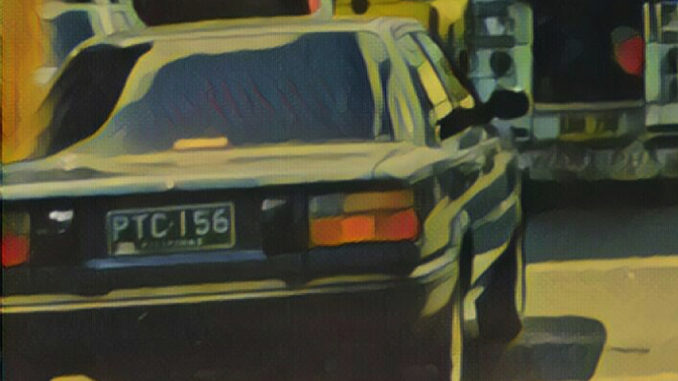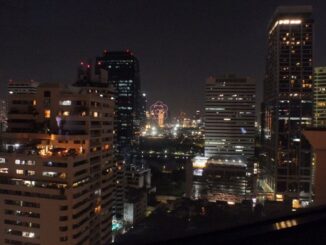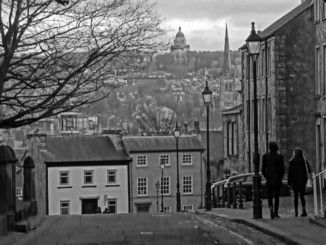
© Always Worth Saying, Going Postal 2020
I’m in my hotel room, above the ‘Anglo Philippine’ office in Davao City, having my siesta. I’m in the dangerous south of the Philippine islands to, amongst other things, make a delivery of school books and find two missing girls who I am certain will have gone to the ‘Utopia’ ideal community that I support in the jungle nearby.
My siesta has come to a rather disappointing end as I wake up to find a man in my room pointing a gun at me. He nods towards a card on the top of my minibar. Wary that crime families and others leave playing cards as a warning at the scenes of their murders, I rise, stark naked, very gingerly indeed. As I picked up the card, my unexpected companion spoke in a very polished Metropolitan Manila English accent, marking him down as one perhaps un-welcome this far south.
‘I have seen it all before, in fact mister, after raiding the fleshpots of Ermita, and encountering international businessmen in their hotel rooms, what I see before me seems refreshingly un-corrupted. Congratulations.’
‘At least I’m alone,’ I replied.
‘Trust me, sir, the ones we find on their own are the worst.’
With the stealth of one who knew what damage a nine millimetre can do to the naked human body at close quarters, I slowly picked up the card and held it to one side of my unwelcome guest’s head. Far from being a ‘playing card of death’, it was an identity card, complete with a nicely matching photo and very long aristocratic name punctuated by a nom de guerre, ‘Cogoy’. Satisfied with the drama, Cogoy jerked his elbow so that the handle of the weapon was beside his cheek and the barrel pointed to the ceiling.
‘Forgive me, mister, in the South one is never quite sure of the type of reception that one will receive. I did have a driver, disappeared, and an assistant, dead. According to the local police, a random shooting, but …’
He damned the local police by ending his sentence with that ‘but’ and letting the word hang on the air. I excused myself and reached into the bathroom for a towel. I quoted from the ID card and passed it back to him,
‘NBI?’
‘National Bureau of Investigation, of course, mister.’
‘You not popular down here, Cogoy?’
‘About as popular as you are in May-nila.’
I sat on the end of my bed wrapped in a towel, he in a wicker chair opposite. I leant forward, looking him in the eye, a finger and thumb placed on my chin in curiosity.
‘Explain,’ I instructed him.
‘Your friends in Paranaque Municipal Jail, Mr Hubert Webb and his visitors are rather indiscrete within earshot of our friends in Paranaque Municipal Jail, warders and informants. You do realise they are ripping you and your businesses off at every turn?’
‘No, they aren’t,’ I assured him, ‘they are treasured business associates and dear colleagues. We have a mutual interest. A business interest for the benefit of all. The best type. We all get what we need from each other. You could even call it ‘love’.’
‘Believe what you will, mister,’ he replied, ‘they rob you blind and, to cover the crime, will kill you if you return to May-nila.’
‘A maid up there told me I’d be killed if I came back down here and look, still alive. It’s the New South, Cogoy, relax.’
Cogoy shrugged and let the corners of his mouth drop.
‘There is time yet, mister.’
He developed a theme, moving along a queue of undesirable types he claimed wanted to harm your humble narrator.
‘In the capital, the NBI and some of the politicians find you rather embarrassing. Rapist murderer Webb, smuggling drugs, walking out of jail, blundering into the Moro terrorist cells, getting within a few feet of the Pope, befriending girls who disappear, bounty hunters. We natives can only take so much Utopia’, he observed, ‘I was sent here with two things to do, mister, find those missing girls and …’
I interrupted enthusiastically, ‘Have you found them? Matilde and Johanna? We can do it together, find them. A promotion for you, perhaps? I have the protection of Mr Victorio Cortez and even the mayor, Mr Roderigo Duterte, a friend of mine, I helped him to win the election. They will be at Utopia but it is difficult to get there. The area around about is often critical. My dear friend Mr Cortez arranges such things but he is difficult to find. A very busy, and well-respected businessman, as you know’.
‘Did Cortez or Duterte meet you at the airport?’ he retorted, ‘Are you staying in their homes? Have they sent drivers for you? Does Duterte even know you exist?’
We sat in silence for a moment.
‘Mayor Duterte is in it for himself. He thins-out the competition and takes all the credit for himself,’ Cogoy observed, ‘He will go far. No, I haven’t found the girls and with no driver and no assistant, I am a dead man. I escape to Manila on this evening’s flight. You are a dead man too, mister.’
I shook my head in disagreement, ‘You said you had two things to do,’ I observed, ‘Perhaps more luck with the second?’
‘I must give you professional advice. The best bodyguard and drivers to hire for you, make your way overland to Zamboanga and from there by sea to Cebu, where there are international flights. I have to write a report. When I hear you’ve gone, I’ll be very generous about you. Stay, and your obituary might not be so kind. Perhaps even found in a hotel room, alone, un-natural and …’
He didn’t complete the sentence. The aircon rattled. A whistle sounded in the lumber yard. Did a gecko call out? He rose and holstered his gun. I asked him how he’d found me. There were only four tourist hotels in the city, only two had aircon. He was stopping at the other one and I was oft sat in an office window beneath the fourth. I would have been harder to miss. How did he get into my room?
‘Asked the duty manager for the key, I am a police officer.’
We shook hands.
‘Mister, please leave this place’, was his parting remark.
He left, presumably to a fast, private taxi to the airport. It was dangerously close to sunset. I locked my door, bolted it, put the chain on and propped the wicker chair under the door handle, wary of being interrupted again.
***
Considering the circumstances, I enjoyed a remarkably good night’s sleep. Refreshed, I was up at about 5 am, just before first light. Being so close to the equator, the length of the days varied very little. There was little variation in the weather either. It was the same every day: boily hot and dry, until the rainy season when it was the same every day anyway: boily hot and wet.
I breakfasted out of the minibar, a Yumyum snack and a bottle of mineral water. I picked up the phone, tried ‘9’ for an outside line, no luck, then 1 to 9, still no luck, then phoned reception, there weren’t any outside lines. I must go to the post office and book a long-distance call from the PDLT. Trying my own cell-phone, no signal.
I left the Durian Hotel with a few schoolbooks clutched to my chest. One of the security guards wished me a nice day. I stood by the roadside, pulled myself up to my full height, stuck my chest out in parade ground style and felt very alone. The place was deserted, except for one other figure. Behind the three sides of wire, partly surrounding the municipal jail opposite, nothing stirred. On the main road, there were no cars or jeeps. All that moved was the tangle of wires between the roadside poles, swaying gently in a light breeze from the gulf.
It wasn’t quite daylight and therefore not yet the rush hour. For these latitudes, it was still pleasantly cool and for this city, surprisingly noiseless. There had been gunfire during the night, ominously a row of bullet holes started and ended below the ‘Anglo Philippine’ office window. Across the road, that figure was the girl that I’d seen the previous day, apparently scouting my office. ‘Scout’ was standing at the jail bus stop, as if pretending to wait for a jeepney. I’m a great believer in, ‘If not me, then who? If not now, then when?’. I began to cross the road towards her.
As she saw me, she turned and walked away, along her side of the pavement, in the ‘town’ direction. She moved very deliberately, marching with her head held high as if a book was balanced upon her forehead. I allowed her to get a fair distance ahead of me and did not hasten my step. After what had happened with Matilde and Johanna, the last thing I wanted was to be spotted sprinting down the street behind a young woman. Stepping over a wide and apparently bottomless hole in the kerb, I noticed that she’d turned right onto a rough track, bounded by some vegetable plots and a squatter’s area.
As if Janus out for his morning stroll, as she walked past, all seemed to spring to life. People emerged into outdoor kitchens. A mother chopped the heads of fishes, a daughter held a can over a smelly fire. A tied-up pony began kicking the dust. The sun popped up. Chattering began, doors opened. Even a car went past. I heard the Angelus being sung so beautifully that I can’t find the words to describe it. Amongst this, I’d lost sight of my little scout. These homes were corrugated and makeshift but they gave way to rows of small bungalows, all with a front door between two front windows beneath a pitched roof, making them look like a terrace of grumpy faces. There was no need for glass, stout decorative bars stood before fine insect mesh. Neither did there seem to be a need for signposts or street names.
In the far distance, the mountains appeared, coated in an impenetrable green all the way to their summits. Nature had no need for a tree line or bare rock this close to the Equator. Never troubled by glaciers, the slopes were gentle and uninterrupted all the way to their smooth tops, rows of which unfolded to a vanishing point, as if all the way to infinity. I came to a store which was just a small shed with a long counter open to the street. Brightly hand-painted cola and snack signs covered its frontage. I bought a straw and a polythene bag of juice. I asked if a young woman had just passed. The girl looked puzzled and shrugged. I described Scout. No response. I bought a snack bar and chanced at,
‘Is there a Cortez property nearby?’
The store girl described a dwelling, two tracks along, a few plots down. She pointed towards a road and told me it was number fourteen. It had a nice roof and curved bars on its windows, she said. I thanked her and strolled on, finding the street but unable to see any numbers on the houses. Fortunately, there didn’t have to be. A dog barked. I heard it being kicked. A door opened and a dog flew out. It was scrawny, its bark an order of magnitude worse than its bite. Scout jumped out behind it. She picked up a handful of dry earth and threw it after the dog.
I walked up to her. She stood before me, silent. She looked up at me, her neck almost at a right angle as I was so much taller. She shielded her eyes with her hand, as though my head was up there somewhere in the clouds. She made a strange noise.
‘OO oo OO.’
‘Excuse me, miss. Speak English?’
‘MM mm MM.’
Which I took to mean ‘Of course, old chap.’
‘I’m looking for Mr Victorio Cortez and his daughter Miss Cortez. I have a package for them. I would have brought it only,’ I shrugged, still clutching those schoolbooks to my chest, ‘it’s at my accommodations. I have a couple of samples. I wasn’t sure exactly where I would find the Cortez’s, so.’
She stepped towards the bungalow and held its mesh door open for me. Inside, the front room was simply laid out and probably accounted for about half of the size of the property. There was a large fan in one corner. A double seat backed onto one wall and, at right angles to it, a single seat backed onto another. Between them was a table. At the other side were an electric cooker, sink and basin. I presumed the other half of the property would be two or three small bedrooms.
I asked of her, ‘Did they send you? The Cortez’s?’
She didn’t reply, rather I was directed to sit and, presently, given a glass of water.
Scout remained standing and forced a smile in my direction, looking more afraid than welcoming.
‘Mr Cortez is not here, may I take a business card?’, her voice was soft, almost noiseless, as if no more than air being exhaled. She held out a hand. I tucked one of my business cards into a schoolbook and passed it to her. Her face lit up.
‘Ah, textbooks, the students will be so grateful’.
‘Is Mr Cortez nearby? I should really say hello to him. There’s the rest of the books to deliver’.
I tried again, ‘Where is he now please? Is he nearby?’
Persisting, I continued, ‘It would be rude to him and his family if I left without passing on a blessing in person’.
My next pitch was, ‘Might he be at church or school?’
At this point she bit, ‘It is always good to talk to Father Conrad,’ she whispered.
To be continued……
For a recap of the story so far, please click here.
The Goodnight Vienna Audio file



